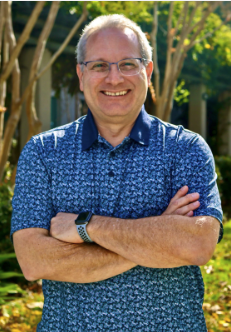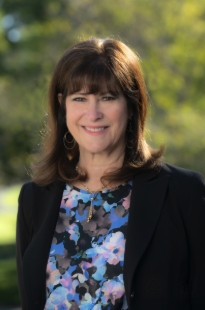Co-Directors Drs. Leslie Thompson and Brian Cummings
Brian Cummings, Ph.D.
Co-Director
Biography
Dr. Cummings earned a B.S. in Psychology and a B.A. in Philosophy from the University of Illinois, and a doctorate in Psychobiology from UCI for work on the neuropathology in Alzheimer’s disease and dementia. He was a lecturer in Neuroscience at Harvard Medical School, working on animal models of neurodegeneration and neurotrauma, and an Instructor of Science Writing at Brandeis University. His early work established the aged canine as a natural model of amyloid pathology, and he was the first to demonstrate that aged cats exhibit Alzheimer’s pathology. In 1997, Dr. Cummings returned to Irvine and helped build the science department at Sage Hill School, a private high school in Newport Coast, CA. In 2002, he joined the Department of Physical Medicine & Rehabilitation at UCI, where he began a collaboration with his wife, Aileen Anderson, Ph.D., on a stem cell therapy for spinal cord injury. Their pre-clinical work on the use of human neural stem cells to treat thoracic spinal cord injuries supported a Phase I/II trial in Switzerland in collaboration with Stem Cells Inc.
Research in Lay Terms
Neurotrauma Is a silent epidemic; brain injuries are the leading killer of children and young adults. Dr. Cummings investigates the mechanisms of recovery mediated by human stem cell transplantation after neurotrauma (in both spinal cord injury and traumatic brain injury). He also studies the link between repeat mild concussions and long-term dementia and neurodegeneration. Neurodegeneration and regeneration represent critical basic science arenas for understanding basic biology as well as therapeutic targets for functional recovery. Thus, his lab is interested in factors affecting the survival, engraftment, migration, and differentiation of stem cells both in animal models and in cell culture models.
Research Focus
How can we use human neural stem cells to treat CNS injuries? How do human neural stem cells interpret the niche? Can transplanted stem cells integrate (form new myelin or make new synapses) with the host or do transplanted cells modulate their new environment? Can we combine biomaterials with stem cells for use in the CNS? How can we prevent the body’s immune system from responding to transplanted stem cells?
Research Details
Dr. Cummings demonstrated that human neural stem cells differentiate into neurons, which form synaptic connections with an injured mouse host and oligodendrocytes, which remyelinate mouse axons. The behavioral improvements are abolished following selective ablation of engrafted human cells, demonstrating that human neural stem cells functionally integrate with their host and form meaningful connections (Cummings et al., PNAS, 2005, Hooshmand et al, PLoS One 2009)
He is the Principle Investigator (PI) on a CIRM TRAN1 award investigating the potential use of human ES-derived neural stem cells in contusion induced traumatic brain injury (TBI), and co-PI on an NIH RO1 award investigating the potential of multilumen scaffolds and other bioengineering approaches to enhance neural regeneration in the injured spinal cord in collaboration with Dr. Lonnie Shea at the University of Michigan and Dr. Aileen Anderson at UCI. His embryonic stem cell derived neural stem cell product has been shown to be efficacious in both a rodent and non-human primate model of TBI. The Cummings lab will be filing a preIND with the FDA in 2025 to seek guidance on moving this cell therapy forward.
With his post-doctoral fellow, Dr Joanthan Hasselmann, he holds a CIRM DISC0 grant using xenografts of human stem cell derived microglia (from the Blurton-Jones lab) transplanted into repeat mild closed head injury (CHI) in mice followed by scRNA-seq of human microglia to provide a transcriptomic map of the activation states that occur at multiple timepoints across the post-injury period, and to generate CRISPR-edited cell lines to delivery therapy. This work will confirm the spatial and temporal accuracy of the transcriptomic data, assess the efficacy of targeted mature BDNF delivery, and provide preliminary data for a targeted peptide delivery mechanism that can be expanded in future studies
In his spare time he enjoys skiing, mountain biking, and riding horses (both english and western).
PubMed Link
http://www.ncbi.nlm.nih.gov/pubmed?term=cummings%20BJ%20AND%20irvine

Email: cummings@uci.edu
Department Affiliations:
Department of Physical Medicine & Rehabilitation, Institute for Memory Impairments and Neurological Disorders, Department of Anatomy & Neurobiology
Favorite book:
“The Lord of the Rings” - JRR Tolkien
Favorite Movie:
Blade Runner - Ridley Scott
Favorite Quote:
"All tyranny needs to gain a foothold is for people of good conscience to remain silent." - Thomas Jefferson
Leslie M. Thompson, Ph.D.
Co-Director
Biography
Dr. Thompson is a Bren Professor in the Department of Psychiatry and Human Behavior in the School of Medicine and in the Department of Neurobiology and Behavior in the School of Biological Sciences, with a joint appointment in the Department of Biological Chemistry. She earned her PhD at UCI in the field of yeast genetics and mitochondrial function and stayed on as a postdoctoral fellow working on Huntington’s disease (HD) in the laboratory of Dr. John Wasmuth prior to her appointment as faculty at UCI. During her postdoc she was a member of the International Huntington’s Disease Collaborative Research Group that identified the gene and mutation in 1993 that causesHD, a devastating neurodegenerative disease that currently has no treatment that changes the course of the disease. Since that time, her laboratory has been actively engaged in investigating the fundamental molecular and cellular events that underlie how the mutant HD gene causes neurodegeneration with the goal of developing new treatments, including cell and gene therapies. Dr. Thompson was a participant in the Venezuela Huntington’s Disease research group. She also studies mechanisms involved in Amyotrophic Lateral Sclerosis (ALS) and X-linked dystonia-parkinsonism (XDP). Dr. Thompson is a AAAS fellow, founding Co-Editor in Chief of the Journal of Huntington’s Disease, Chair of the SAB of the Hereditary Disease Foundation, member of the SAB of HDSA, member of EHDN and member of the steering committee for Stem Cells for HD (SC4HD) and Advanced Therapies Working Group (ATWG).
Research in Lay Terms
Huntington’s disease (HD) is a devastating degenerative brain disease that inevitably leads to death. HD has no disease modifying treatment and symptoms unstoppably progress for 15-20 years, with onset typically striking in midlife. Because HD is genetically inherited and caused by a dominant mutation, the disease has a 50% chance of being inherited by the children of patients. Because HD is a single gene disorder, the study of genetic models of the disease has been feasible, including the ability to use induced pluripotent stem cells (iPSCs) derived directly from patient skin or blood cells to better understand disease mechanisms and develop therapeutic interventions. Applications of hESCs and iPSCs may provide insights into treating HD and other brain diseases that are not caused by a single, known mutation.
Research Focus
The laboratory research focuses on neurodegenerative disorders, primarily Huntington’s disease (HD), a devastating neurodegenerative disease. The lab is using stem cell approaches to investigate mechanisms that contribute to HD, amyotrophic lateral sclerosis (ALS), and X-linked dystonia-parkinsonism (XDP) and to identify potential therapeutic targets and treatments.These efforts include the clinical application of transplantation of human stem cell-derived products.
Research Details
Since the discovery of the HD gene, Dr. Thompson’s work has focused on understanding pathogenic mechanisms in HD with the goal of slowing or stopping progression of disease. Her laboratory has made significant progress toward understanding how the mutation promotes deleterious effects including aberrant transcriptional regulation and splicing, altered protein clearance, epigenetic changes, impaired mitochondrial dynamics and other changes. The group also studies how the mutation impacts the normal function of the HTT protein. These studies include the use of patient iPS cells to more closely replicate disease phenotypes, understand underlying mechanisms and for use in drug development. Dr. Thompson’s group has developed pipelines for RNA sequencing methods including bulk and single cell RNAeq and spatial transcriptomic and epigenetic approaches. They have also identified critical post-translational modifications of HTT, including SUMO modification, and have identified enzymes that mediate these modifications and are current drug targets. Working collaboratively across research labs, the group discovered impairments in DNA damage repair pathways and are studying the relationship of SUMOylation to complex activity. More recently Dr. Thompson has focused on RNA methylation and dysregulation, and discovered TDP-43 dysregulation in HD, a common thread with studies of ALS and other neurodegenerative disorders.
An exciting direction for the group is an FDA authorized clinical trial for safety and exploratory efficacy of transplantation of human neural stem cells into the affected brain regions of HD patients, made possible through grants funded by the California Institute for Regenerative Medicine.

Email: lmthomps@uci.edu
Department Affiliations:
Psychiatry and Human Behavior, Neurobiology and Behavior Biological Chemistry, UCI MIND, SCRC, CNLM
Favorite book:
Bird by Bird, Anne Lamott
Favorite Movie:
Moonstruck
Favorite Quote:
"We gain strength, courage, and confidence by each experience in which we really stop to look fear in the face.” Eleanor Roosevelt